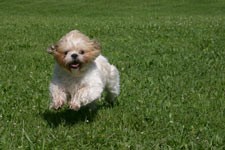Shih Tzu Dog Breed
Dog Group: Toy Group
Class: Toy
Description

The Shih Tzu is a small and proud-looking toy dog, with distinctive long, luxurious hair. The name Shih Tzu actually means lion dog in Chinese, and it was given this name due to its abundance of hair, which was supposed to resemble a lion’s mane. The face of the Shih Tzu is small and sweet, with big, round eyes and a short, hairy muzzle. Perhaps the most distinctive feature of the dog’s face is the way that the hair gives it a beard and moustache-like appearance.
The Shih Tzu has small, but very hairy pendant ears and a sturdy tail that curls over the back. This is a very sturdy little toy dog, with a proud and perhaps even snobbish expression at times.
Temperament
If you are looking for a lively, energetic dog with lots of character then you’ll love the Shih Tzu. The size of this toy dog does not stop if from being brave, and it is also a very loving and loyal breed. The Shih Tzu is a gentle dog, but can be stubborn and willful at times, so training may not always run as smoothly as you’d like. This breed has a charming playful streak and is also very alerts. The Shih Tzu loves company, and tends to get on well with other pets and children. However, older children are probably better companions for this breed, as the Shih Tzu can snap if scared or teased.
Height and Weight
The Shih Tzu is a little dog, and this breed will reach around ten inches in height. The weight of the typical Shih Tzu can reach around 9-16 pounds.
Common Health and Behavioral Problems
The short muzzle of the Shih Tzu means that it can be prone to wheezing and have respiratory issues. Other health risks include oral problems/early tooth loss, obesity, spinal problems, ear and eye infections/problems.
Ideal Living Conditions
The Shih Tzu is well suited to life in either an apartment or a house. This breed doesn’t necessarily need a yard or garden, although you will need to ensure that your dog gets regular exercise. Be careful during the warmer months, as this breed is very heat sensitive.
Exercise Requirements
The Shih Tzu does have a lot of energy, but is also prone to laziness if given half the chance. You must therefore encourage your dog to take exercise and actively play – ensure that he gets his daily walk and get involved in interactive play. Without regular exercise the Shih Tzu can quickly pile on the pounds.
Diet and Nutrition
Always remember that the Shih Tzu is only a small dog, and don’t feel tempted to overfeed him when he looks at you with those big round eyes. This breed is prone to weight gain and obesity, so you must carefully monitor portion sizes. A dry food will benefit your Shih Tzu, as this will help to maintain oral health. Always ensure that your Shih Tzu has access to clean, fresh water.
Life Expectancy
A healthy Shih Tzu can expect to live to around fifteen years or even longer. Obviously, a healthy lifestyle, diet and exercise will help to maximize on his lifespan.
Grooming Requirements
The Shih Tzu is not a big shedder, and therefore makes a good pet for those with allergies. However, this breed does require dedicated grooming, and you will need to brush the long hair of your Shih Tzu on a daily basis. You may want to get the topcoat trimmed over the face, as otherwise your dog won’t be able to see properly. If you don’t want to trim his coat, you can tie it up, out of his face. Grooming time is also the time to check his ears, eyes and mouth, as these are all high-risk areas for a Shih Tzu.
Origin
The Shih Tzu originates from Tibet, and is thought to be the result of crossing the Tibetan Mountain Dog and the Pekingese. A favorite breed with Chinese high society, the dog made its way to England in the 1930s. After the war, servicemen going back to their homes in the Unites States introduced the breed there. The Shih Tzu is a very recent addition to the American Kennel Club recognized breeds, and was not registered until 1969.
 |
 |
Secrets to Dog Training: Consultation
Secrets to Dog Training offers a free consultation with every order! Here is one submitted by Janie about her 2 Shih Tzu’s and 4 cats in her home...
Janie's Consultation
Dear Daniel,
I have 2 Shih Tzu’s and 4 cats in my home, the dogs are mine and two of the cats belong to my partner. When we moved in together a year ago, the cats and dogs didn't get on at all. However, one of the cats had kittens, and over the past 7 months we have slowly reached a point where the cats and dogs happily live together! We are both delighted with this progress; however, there is one curious behavioral problem that we can't understand. Our younger dog, Giddy, is 2 and a half, he never had a big problem with the cats, but now that everyone is getting along, he seems to like the cats a little too much. He sometimes tries to mount the kittens and frequently sits beside one or other of the kittens for 20 or 30 minutes licking the kitten’s ear. We stop him whenever we catch him doing it, but he still continues this whenever he is along with them. Sometimes he licks them to the point where their whole head is wet.
It is not a dangerous problem, and the kittens don't seem to mind too much, but we both find it rather odd, and we were wondering firstly if you could explain why a dog would do this, and secondly if there is any way to stop it?
I hope you can answer my question, or at least give some suggestions!
Kindest regards,
Janie
Secrets to Dog Training Reply:
Hi there Janie,
Thanks for the email regarding your kitten loving Shih Tzu Giddy (great name by the way!). I must admit that your email made me laugh as I pictured a kitten with a drool covered head!
You are right in that it is not a dangerous problem and it is good that the kittens don’t seem to mind it. It is much better for the situation to be like this rather than completely the opposite with the dogs and cat/kittens fighting or not getting on well.
I think you will find the current behavior will stop as the kittens grow up and become more adult. They will probably act differently towards Giddy’s behavior and because they are adult they will hopefully look (or at least TASTE) different!
From a health and Veterinary perspective, it is not harmful at all, just a little confusing as to what is going on in Giddy’s head. Is he being protective and loving? Or do they just taste nice!!!? I doubt either of us will ever know. If we could ask Giddy he may not even know himself! The fact that he is humping, or at least mounting them though does give us some clues.
It is important to try and alter at least the mounting behavior, not because anything is likely to happen, but the behavior will probably soon start spreading to mounting of your leg, the sofa, and so on and so on! Because of this mounting and the potentially ‘protective’ nature of his licking the kittens, I am thinking that Giddy feels more dominant than these kittens (since they’re new to the family) and thus he feels as though he needs to protect them and the mounting of them is also a sign of dominance. For this reason, I would encourage you, and any other family members, to read the bonus book "Secrets to becoming the Alpha Dog". This book will give you a good understanding of the hierarchical nature and behavior of your dog.
It is definitely worth considering having Giddy neutered as this tends to lessen dominance like behaviors and will probably help in this situation to both stop the mounting and hopefully even help stop the licking behavior
Reprimanding Method
You should reprimand your dog for his mounting of the kitten, so as to prevent his behavior from becoming a habit. Next time you see him displaying this behavior you should make a loud noise to startle him, such as shaking a can of pebbles, or you can squirt Giddy with a water pistol. Combine these with a guttural growl (AAAAH). As soon as Giddy stops the mounting, praise him so that he understands the difference between acceptable and unwanted behavior.
All the best with Giddy’s training. You have a very exciting and unique problem that isn’t dangerous at all; however completely stoppable should you wish it to be. We would love to have a photo of the behavior (the licking that is!) should you want to take a quick snap of it and send it through to us before beginning your training with him!
Best of luck and kind regards,
Daniel Stevens
Secrets to Dog Training Team
http://www.kingdomofpets.com/dogobediencetraining
More Resources
 |
 |
Want to find out about more dog breeds? Search here or go to our Dog Breed index.
Got Dog Obedience Training or Problem Behavior Issues?
Is your dog trying your patience on a daily basis? Are you constantly faced with a dog that displays one of the following issues? To find the solution to your problem click on it.. you'll discover the answers to it and other common dog problems you may be facing.
This is the most comprehensive book on dog training and behavior problems around. Best of all... You can download this book to your computer and be reading and using the professionals training techniques in minutes.
About The Author
Daniel Stevens is the renowned dog trainer and author of Secrets to Dog Training: STOP Dog Behavior Problems!, one of the leading dog training guides on the market today selling over 25,743 copies (and counting). He currently heads the Kingdom of Pets dog training team.

